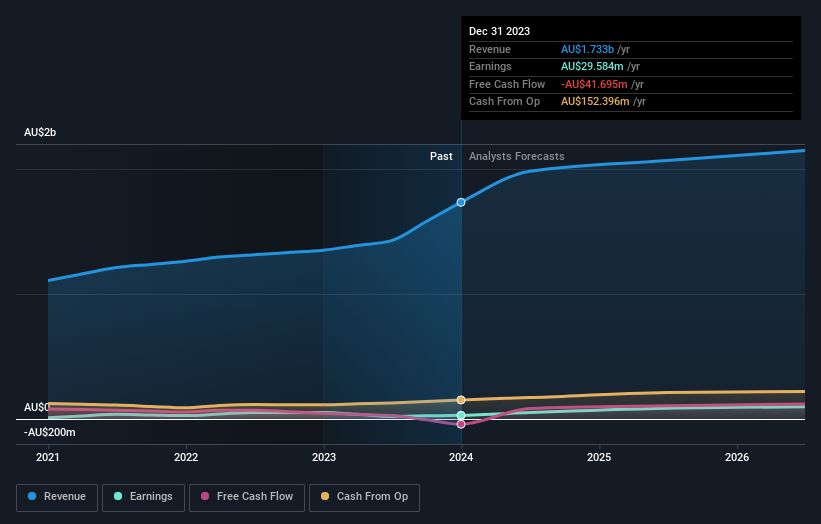Kelsian Group Limited's (ASX:KLS) last week's 7.3% decline must have disappointed individual investors who have a significant stake
Key Insights
Kelsian Group's significant individual investors ownership suggests that the key decisions are influenced by shareholders from the larger public
The top 12 shareholders own 51% of the company
If you want to know who really controls Kelsian Group Limited (ASX:KLS), then you'll have to look at the makeup of its share registry. And the group that holds the biggest piece of the pie are individual investors with 35% ownership. Put another way, the group faces the maximum upside potential (or downside risk).
As a result, individual investors as a group endured the highest losses last week after market cap fell by AU$129m.
Let's delve deeper into each type of owner of Kelsian Group, beginning with the chart below.
Check out our latest analysis for Kelsian Group
What Does The Institutional Ownership Tell Us About Kelsian Group?
Institutions typically measure themselves against a benchmark when reporting to their own investors, so they often become more enthusiastic about a stock once it's included in a major index. We would expect most companies to have some institutions on the register, especially if they are growing.
As you can see, institutional investors have a fair amount of stake in Kelsian Group. This can indicate that the company has a certain degree of credibility in the investment community. However, it is best to be wary of relying on the supposed validation that comes with institutional investors. They too, get it wrong sometimes. If multiple institutions change their view on a stock at the same time, you could see the share price drop fast. It's therefore worth looking at Kelsian Group's earnings history below. Of course, the future is what really matters.
Kelsian Group is not owned by hedge funds. Neil Smith is currently the company's largest shareholder with 9.9% of shares outstanding. In comparison, the second and third largest shareholders hold about 7.2% and 5.3% of the stock. In addition, we found that Clinton Feuerherdt, the CEO has 2.3% of the shares allocated to their name.
A closer look at our ownership figures suggests that the top 12 shareholders have a combined ownership of 51% implying that no single shareholder has a majority.
While studying institutional ownership for a company can add value to your research, it is also a good practice to research analyst recommendations to get a deeper understand of a stock's expected performance. Quite a few analysts cover the stock, so you could look into forecast growth quite easily.
Insider Ownership Of Kelsian Group
While the precise definition of an insider can be subjective, almost everyone considers board members to be insiders. The company management answer to the board and the latter should represent the interests of shareholders. Notably, sometimes top-level managers are on the board themselves.
Insider ownership is positive when it signals leadership are thinking like the true owners of the company. However, high insider ownership can also give immense power to a small group within the company. This can be negative in some circumstances.
Our most recent data indicates that insiders own a reasonable proportion of Kelsian Group Limited. Insiders own AU$350m worth of shares in the AU$1.6b company. That's quite meaningful. Most would say this shows a good degree of alignment with shareholders, especially in a company of this size. You can click here to see if those insiders have been buying or selling.
General Public Ownership
The general public-- including retail investors -- own 35% stake in the company, and hence can't easily be ignored. This size of ownership, while considerable, may not be enough to change company policy if the decision is not in sync with other large shareholders.
Private Company Ownership
We can see that Private Companies own 23%, of the shares on issue. It might be worth looking deeper into this. If related parties, such as insiders, have an interest in one of these private companies, that should be disclosed in the annual report. Private companies may also have a strategic interest in the company.
Next Steps:
It's always worth thinking about the different groups who own shares in a company. But to understand Kelsian Group better, we need to consider many other factors. Be aware that Kelsian Group is showing 5 warning signs in our investment analysis , and 2 of those make us uncomfortable...
But ultimately it is the future, not the past, that will determine how well the owners of this business will do. Therefore we think it advisable to take a look at this free report showing whether analysts are predicting a brighter future.
NB: Figures in this article are calculated using data from the last twelve months, which refer to the 12-month period ending on the last date of the month the financial statement is dated. This may not be consistent with full year annual report figures.
Have feedback on this article? Concerned about the content? Get in touch with us directly. Alternatively, email editorial-team (at) simplywallst.com.
This article by Simply Wall St is general in nature. We provide commentary based on historical data and analyst forecasts only using an unbiased methodology and our articles are not intended to be financial advice. It does not constitute a recommendation to buy or sell any stock, and does not take account of your objectives, or your financial situation. We aim to bring you long-term focused analysis driven by fundamental data. Note that our analysis may not factor in the latest price-sensitive company announcements or qualitative material. Simply Wall St has no position in any stocks mentioned.

 Yahoo Finance
Yahoo Finance 

